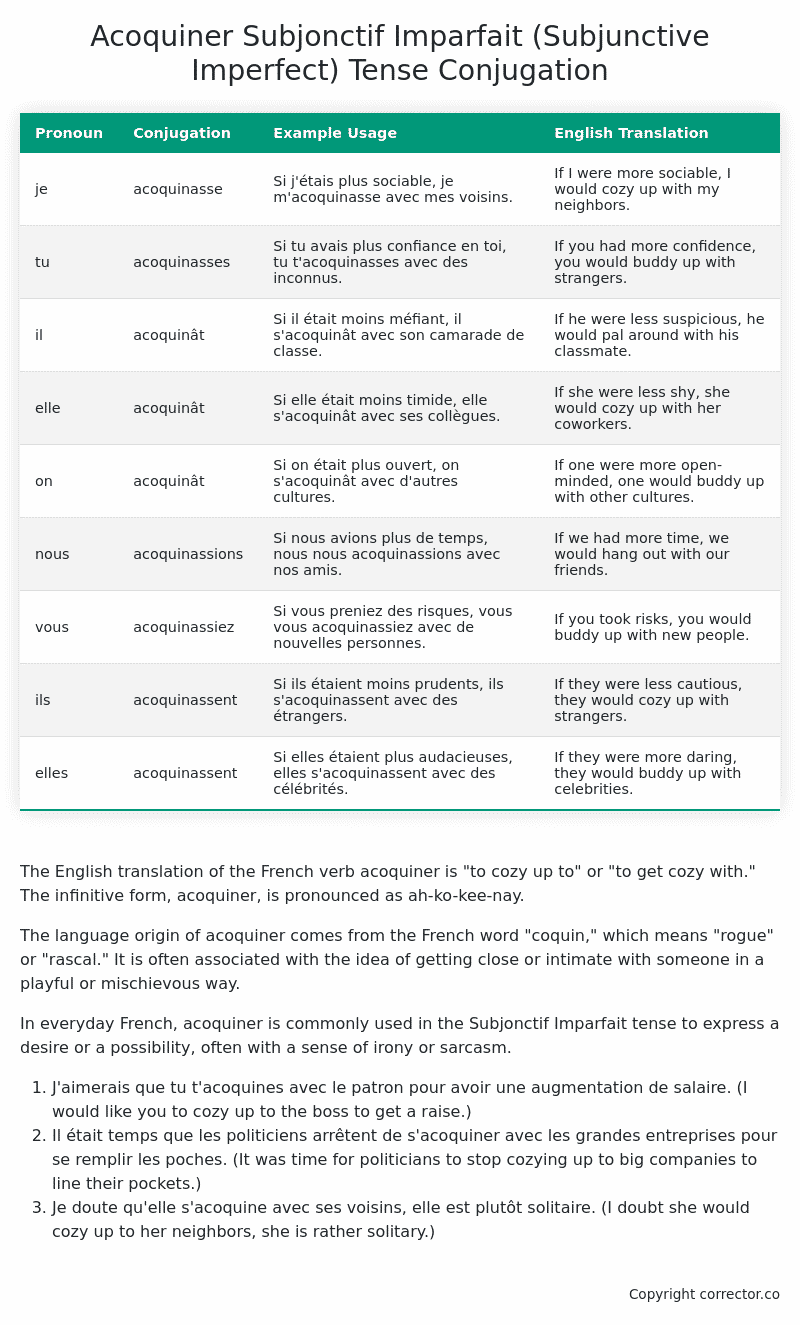Subjonctif Imparfait (Subjunctive Imperfect) Tense Conjugation of the French Verb acoquiner
Introduction to the verb acoquiner
The English translation of the French verb acoquiner is “to cozy up to” or “to get cozy with.” The infinitive form, acoquiner, is pronounced as ah-ko-kee-nay.
The language origin of acoquiner comes from the French word “coquin,” which means “rogue” or “rascal.” It is often associated with the idea of getting close or intimate with someone in a playful or mischievous way.
In everyday French, acoquiner is commonly used in the Subjonctif Imparfait tense to express a desire or a possibility, often with a sense of irony or sarcasm.
- J’aimerais que tu t’acoquines avec le patron pour avoir une augmentation de salaire. (I would like you to cozy up to the boss to get a raise.)
- Il était temps que les politiciens arrêtent de s’acoquiner avec les grandes entreprises pour se remplir les poches. (It was time for politicians to stop cozying up to big companies to line their pockets.)
- Je doute qu’elle s’acoquine avec ses voisins, elle est plutôt solitaire. (I doubt she would cozy up to her neighbors, she is rather solitary.)
Table of the Subjonctif Imparfait (Subjunctive Imperfect) Tense Conjugation of acoquiner
| Pronoun | Conjugation | Example Usage | English Translation |
|---|---|---|---|
| je | acoquinasse | Si j’étais plus sociable, je m’acoquinasse avec mes voisins. | If I were more sociable, I would cozy up with my neighbors. |
| tu | acoquinasses | Si tu avais plus confiance en toi, tu t’acoquinasses avec des inconnus. | If you had more confidence, you would buddy up with strangers. |
| il | acoquinât | Si il était moins méfiant, il s’acoquinât avec son camarade de classe. | If he were less suspicious, he would pal around with his classmate. |
| elle | acoquinât | Si elle était moins timide, elle s’acoquinât avec ses collègues. | If she were less shy, she would cozy up with her coworkers. |
| on | acoquinât | Si on était plus ouvert, on s’acoquinât avec d’autres cultures. | If one were more open-minded, one would buddy up with other cultures. |
| nous | acoquinassions | Si nous avions plus de temps, nous nous acoquinassions avec nos amis. | If we had more time, we would hang out with our friends. |
| vous | acoquinassiez | Si vous preniez des risques, vous vous acoquinassiez avec de nouvelles personnes. | If you took risks, you would buddy up with new people. |
| ils | acoquinassent | Si ils étaient moins prudents, ils s’acoquinassent avec des étrangers. | If they were less cautious, they would cozy up with strangers. |
| elles | acoquinassent | Si elles étaient plus audacieuses, elles s’acoquinassent avec des célébrités. | If they were more daring, they would buddy up with celebrities. |
Other Conjugations for Acoquiner.
Le Present (Present Tense) Conjugation of the French Verb acoquiner
Imparfait (Imperfect) Tense Conjugation of the French Verb acoquiner
Passé Simple (Simple Past) Tense Conjugation of the French Verb acoquiner
Passé Composé (Present Perfect) Tense Conjugation of the French Verb acoquiner
Futur Simple (Simple Future) Tense Conjugation of the French Verb acoquiner
Futur Proche (Near Future) Tense Conjugation of the French Verb acoquiner
Plus-que-parfait (Pluperfect) Tense Conjugation of the French Verb acoquiner
Passé Antérieur (Past Anterior) Tense Conjugation of the French Verb acoquiner
Futur Antérieur (Future Anterior) Tense Conjugation of the French Verb acoquiner
Subjonctif Présent (Subjunctive Present) Tense Conjugation of the French Verb acoquiner
Subjonctif Passé (Subjunctive Past) Tense Conjugation of the French Verb acoquiner
Subjonctif Imparfait (Subjunctive Imperfect) Tense Conjugation of the French Verb acoquiner (this article)
Subjonctif Plus-que-parfait (Subjunctive Pluperfect) Tense Conjugation of the French Verb acoquiner
Conditionnel Présent (Conditional Present) Tense Conjugation of the French Verb acoquiner
Conditionnel Passé (Conditional Past) Tense Conjugation of the French Verb acoquiner
L’impératif Présent (Imperative Present) Tense Conjugation of the French Verb acoquiner
L’infinitif Présent (Infinitive Present) Tense Conjugation of the French Verb acoquiner
Struggling with French verbs or the language in general? Why not use our free French Grammar Checker – no registration required!
Get a FREE Download Study Sheet of this Conjugation 🔥
Simply right click the image below, click “save image” and get your free reference for the acoquiner Subjonctif Imparfait tense conjugation!

Acoquiner – About the French Subjonctif Imparfait (Subjunctive Imperfect) Tense
Formation
Common Everyday Usage Patterns
Interactions with Other Tenses
Subjonctif Présent
Indicatif Passé Composé
Conditional
Conditional Perfect
Summary
I hope you enjoyed this article on the verb acoquiner. Still in a learning mood? Check out another TOTALLY random French verb conjugation!


